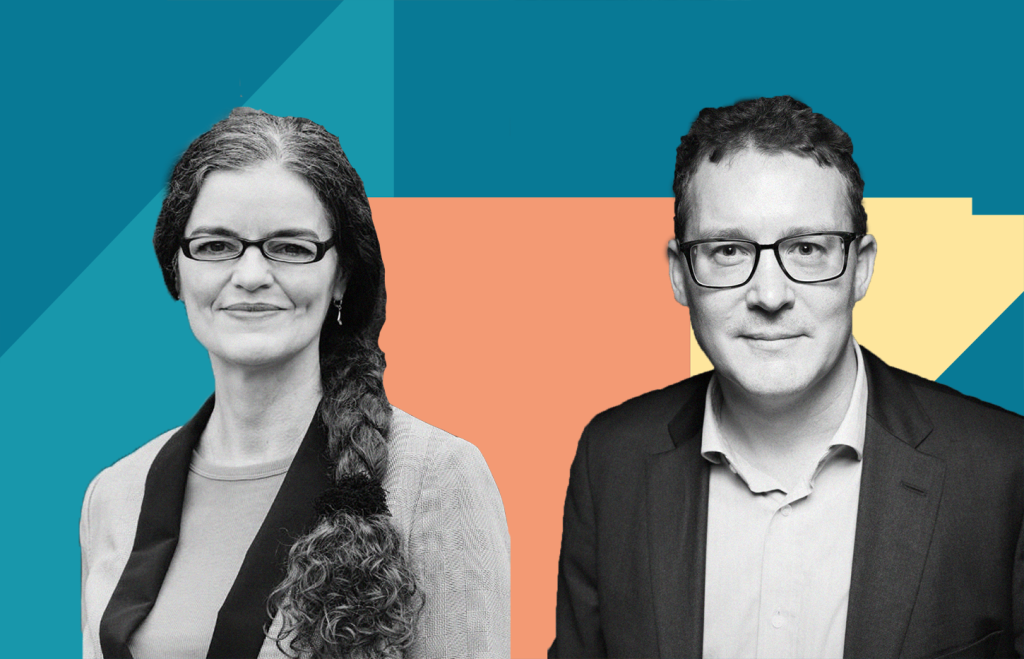Who are our AI Panellists
Joining Laura on the panel are Dagmar Monett and Tim Gordon.
Dagmar is Professor of Computer Science (Artificial Intelligence, Software Engineering), head of the Computer Science Department and Co-Director of the M.Sc. programme on Digital Transformation at the Berlin School of Economics and Law (HWR Berlin).
She is also Co-Founder of the AGI Sentinel Initiative, Co-Founding Member of the Institute for Data-Driven Digital Transformation (d-cube) at the HWR Berlin, and mentor at the Startup Incubator Berlin.
Tim is a Co-Founder and Partner at Best Practice AI, a London-based advisory working with executives in corporates, startups, governmental and non-profit organisations to “accelerate the adoption of ethical, sustainable and value-building AI.”
Tim was previously CEO of the Liberal Democrat Party and an adviser to the UK’s Deputy Prime Minister. He has also worked on digital and AI transformations in a wide variety of media, membership, not for profit and commercial organisations, is Co-Founder of AI-driven call compliance company Salus, and is a member of the Board of Trustees for Full Fact, where he chairs the Automated Fact Checking committee.
The issues with Large Language Models
For Dagmar, the latest AI boom started long before the recent surge in popularity of ‘Large Language Models’ and AI image generation – instead beginning nearly a decade earlier when large volumes of data started to be made available from social media platforms, and deep learning methods dealing with them started to gain attention.”
A critic of the misuse and abuse of Large Language Models, Dagmar believes “they are not good at anything,” adding that the “different possible combinations of all the words and data that is available is actually something that we can use maybe in comedy or for having fun. But even some of their creators, like those behind OpenAI, advise against using them in serious applications, because of all the limitations.”
“One critical point is that most of the data they were and are trained with was, and still is, used without consent. The second point is that it’s based on probability distributions. So the probability of the next words or the next sentence to be outputted might heavily depend on what was already available before.”
“What comes next of course, is strongly dependent on what is available in the data. But today that’s only a very narrow part of reality, which is much more complex. And in the social or political context, dealing with how citizens and societies interact with each other is much more complex, dynamic, and unpredictable than what was available to those models when they were trained.”
“Furthermore these models are prone to bias and discrimination.”
Massive implications for politics
For Tim, as well as concerns around misinformation and disinformation, there are a range of challenges with AI.
“There’s been a general undermining of the sense of what truth is. That’s something that as a society we’re struggling with. I think that it’s also obviously going to lead to massive structural shifts of political power. And then there’s risk around jobs and the impact on individuals. I think that’s something we have to be very worried about, particularly in places like call centres – employers which have historically replaced factories or mines in terms of employment.”
However there are also enormous possibilities for positive change. “In my mind, the implications for politics are absolutely massive. I mean, I can’t even begin to list the number of ways it could be good for political outcomes.”
“I think it’s going to be huge in terms of transforming the communication between citizens and government. Everything from communication across languages, providing very focused information on specific topics. And then I think in education, where I can see it driving personalised teaching, providing tutorial based responses and immediate reactions to classroom work, and more generally enhancing the ability of people to work together in different ways.”
Looking forward to a discussion
With such varied viewpoints and a wealth of diverse expertise, we are looking forward to a healthy discussion and debate.
AI is undoubtedly going to change our world in a variety of incredibly impactful ways, not the least of which lie in the realm of politics, democracy and virtually every area adjacent.
Enormous change is not universally positive or negative, but it does need to be discussed, understood and, where possible, guided in the right direction.
